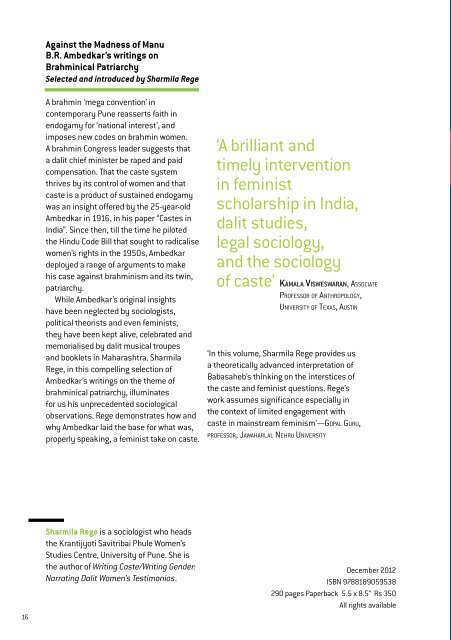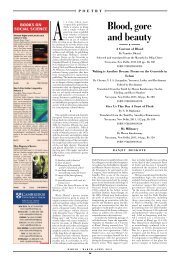etc - Navayana
etc - Navayana
etc - Navayana
You also want an ePaper? Increase the reach of your titles
YUMPU automatically turns print PDFs into web optimized ePapers that Google loves.
Against the Madness of Manu<br />
B.R. Ambedkar’s writings on<br />
Brahminical Patriarchy<br />
Selected and introduced by Sharmila Rege<br />
A brahmin ‘mega convention’ in<br />
contemporary Pune reasserts faith in<br />
endogamy for ‘national interest’, and<br />
imposes new codes on brahmin women.<br />
A brahmin Congress leader suggests that<br />
a dalit chief minister be raped and paid<br />
compensation. That the caste system<br />
thrives by its control of women and that<br />
caste is a product of sustained endogamy<br />
was an insight offered by the 25-year-old<br />
Ambedkar in 1916, in his paper “Castes in<br />
India”. Since then, till the time he piloted<br />
the Hindu Code Bill that sought to radicalise<br />
women’s rights in the 1950s, Ambedkar<br />
deployed a range of arguments to make<br />
his case against brahminism and its twin,<br />
patriarchy.<br />
While Ambedkar’s original insights<br />
have been neglected by sociologists,<br />
political theorists and even feminists,<br />
they have been kept alive, celebrated and<br />
memorialised by dalit musical troupes<br />
and booklets in Maharashtra. Sharmila<br />
Rege, in this compelling selection of<br />
Ambedkar’s writings on the theme of<br />
brahminical patriarchy, illuminates<br />
for us his unprecedented sociological<br />
observations. Rege demonstrates how and<br />
why Ambedkar laid the base for what was,<br />
properly speaking, a feminist take on caste.<br />
‘A brilliant and<br />
timely intervention<br />
in feminist<br />
scholarship in India,<br />
dalit studies,<br />
legal sociology,<br />
and the sociology<br />
of caste’<br />
Kamala Visweswaran, Associate<br />
Professor of Anthropology,<br />
University of Texas, Austin<br />
‘In this volume, Sharmila Rege provides us<br />
a theoretically advanced interpretation of<br />
Babasaheb’s thinking on the interstices of<br />
the caste and feminist questions. Rege’s<br />
work assumes significance especially in<br />
the context of limited engagement with<br />
caste in mainstream feminism’—Gopal Guru,<br />
professor, Jawaharlal Nehru University<br />
16<br />
Sharmila Rege is a sociologist who heads<br />
the Krantijyoti Savitribai Phule Women’s<br />
Studies Centre, University of Pune. She is<br />
the author of Writing Caste/Writing Gender:<br />
Narrating Dalit Women’s Testimonios.<br />
December 2012<br />
ISBN 9788189059538<br />
290 pages Paperback 5.5 x 8.5” Rs 350<br />
All rights available




